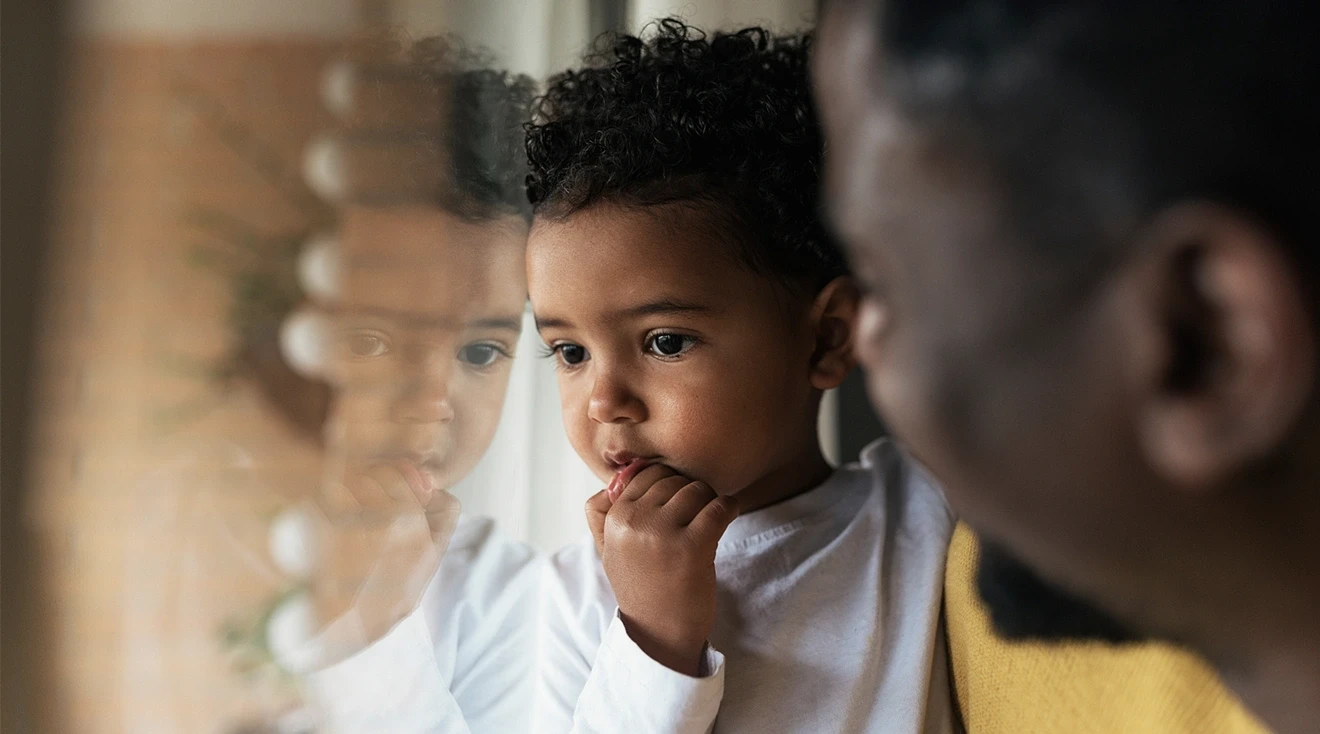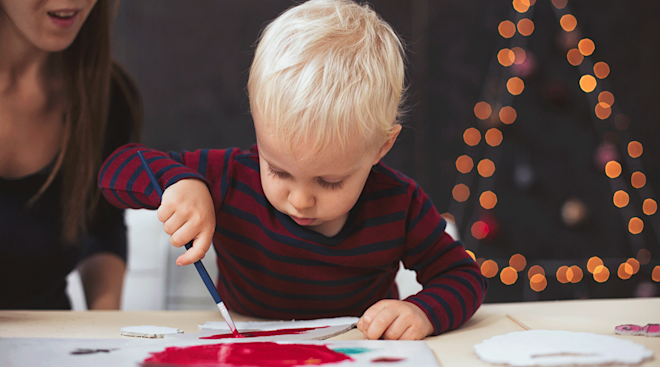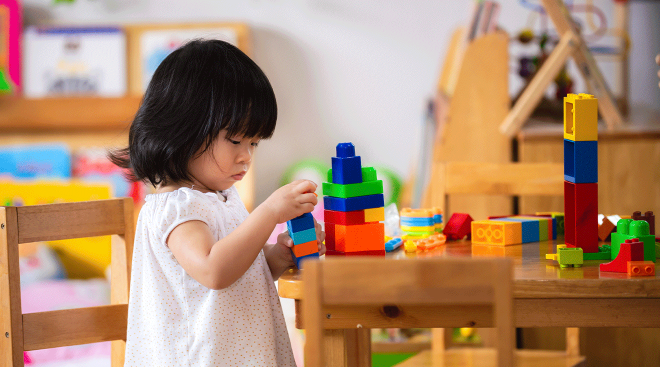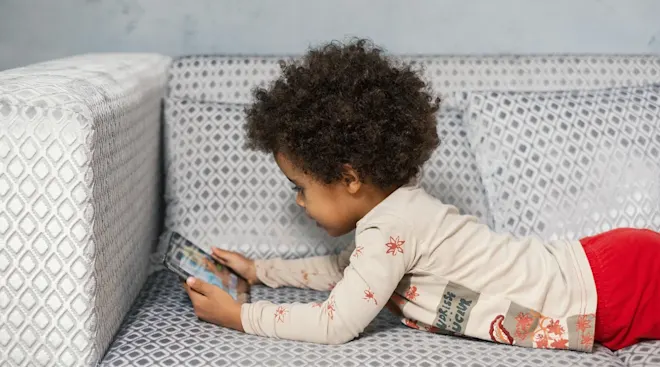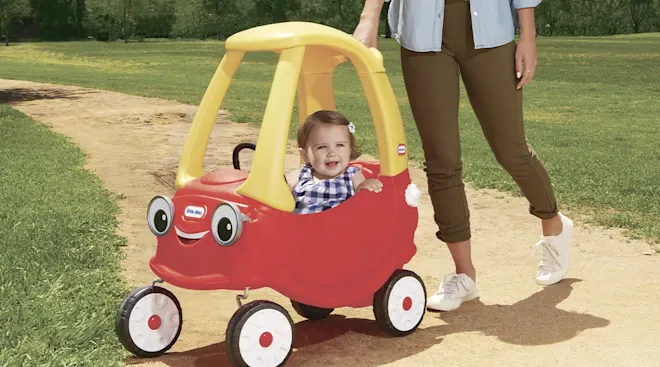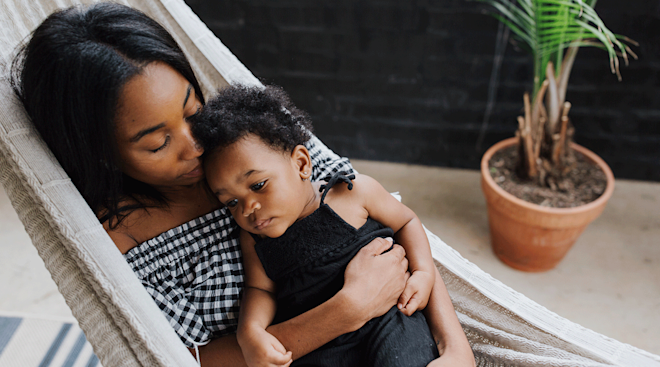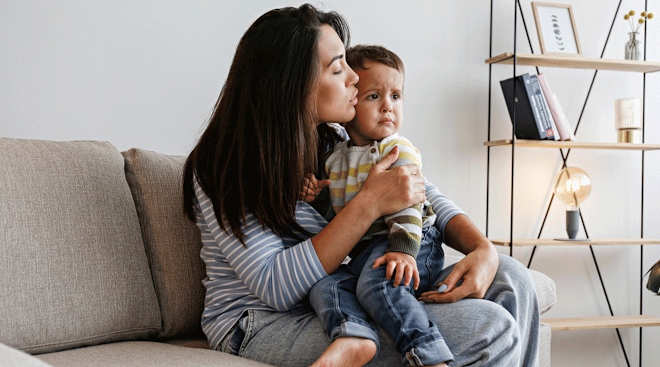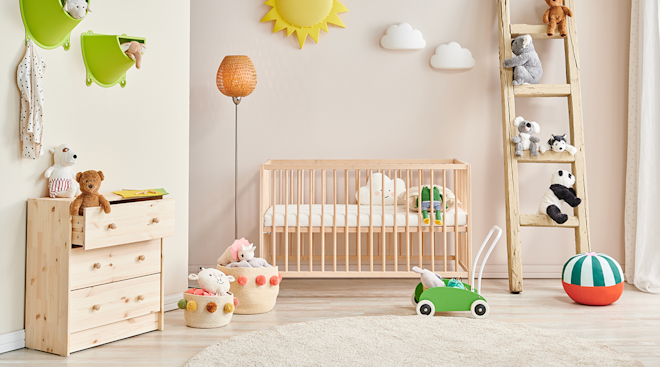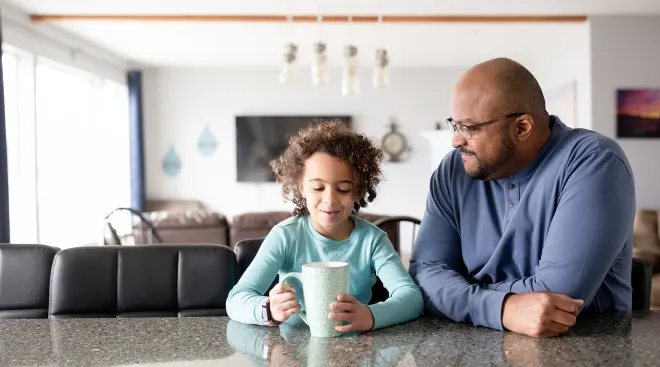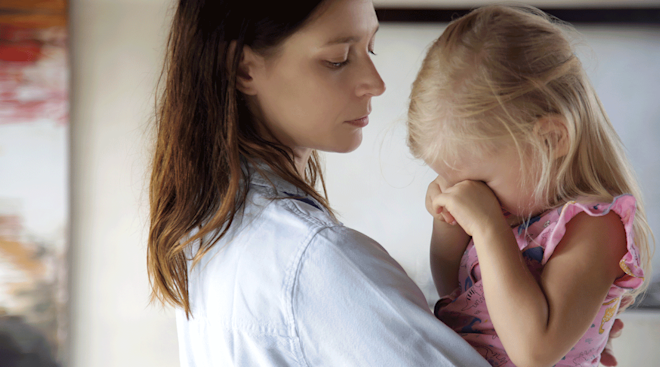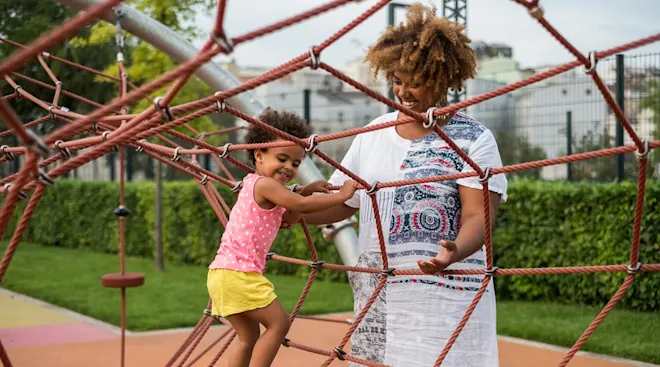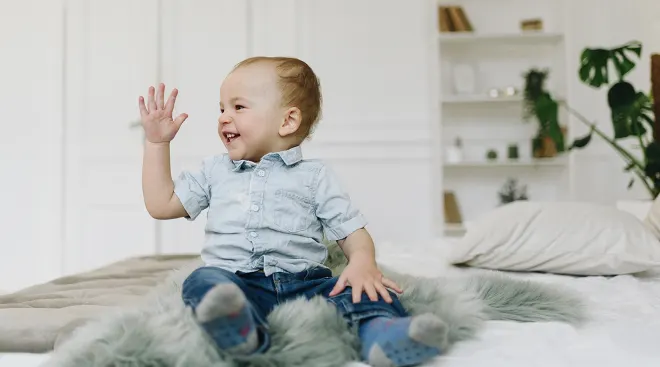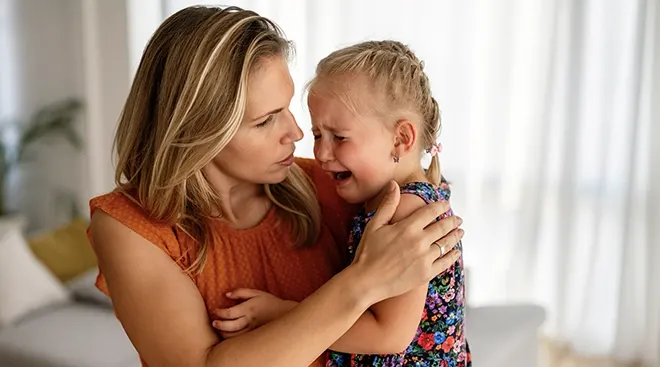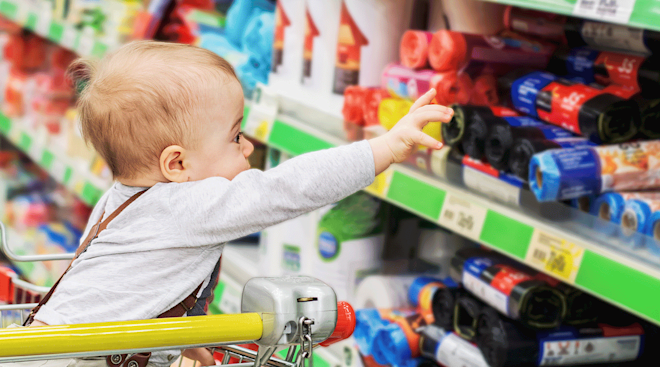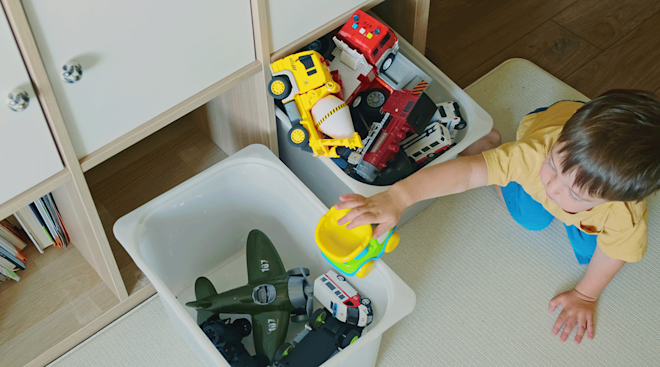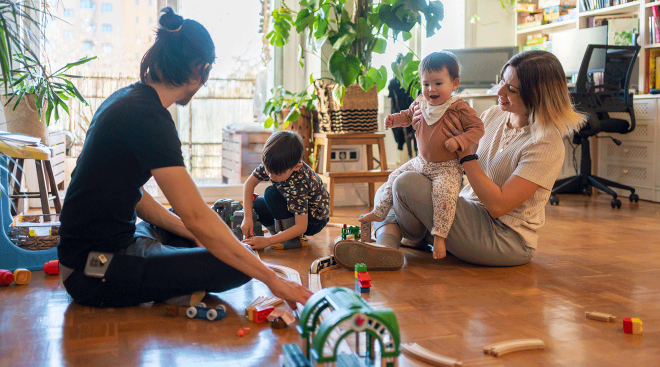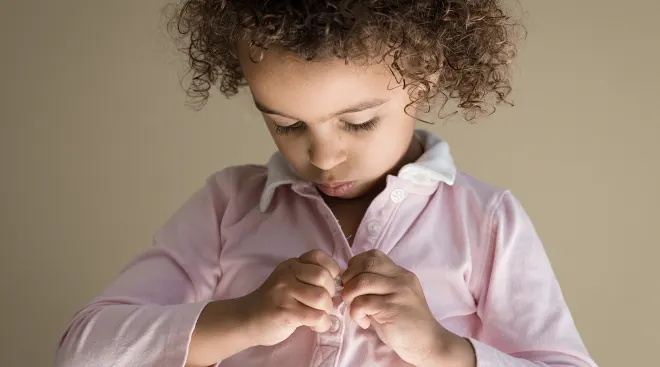How Anxiety and Stress Manifest in Toddlers
Have you ever looked over at your toddler and been just a teensy bit envious of their carefree life? They spend all day every day playing and eating mac and cheese, and they get to nap after lunch. They get read to and bathed. And they have literally zero responsibilities! It’s a sweet deal, that toddler life. But, contrary to what we might think, toddlers do get stressed—and they deal with anxiety too. There are all kinds of reasons why toddlers experience stress and anxiety, and it’s useful for parents to know some of the causes and signs, so that we can step in and help them cope. Here’s what to know.
Just as adults get stressed for various reasons, so do children. It’s very normal for toddlers to experience stress and anxiety when there’s change happening in their world. The change might be something we consider small or inevitable, or it might even be an event we associate with positive change. “Change can bring about feelings of fear and resistance in all of us, but particularly for toddlers, because they have little to no control over their lives and don’t understand why the changes are coming,” says Julie Wright, MFT, a family therapist and the co-author of two best-selling parenting books, The Happy Sleeper and Now Say This.
Wright says that some common causes of stress and anxiety in toddlers include:
- A new sibling joining the family
- Moving
- Starting a new school or daycare
- An illness or injury
- Parental divorce
- Death in the family
- A trip
A new sibling joining the family is one of the most common causes of stress in toddlers, says Wright, adding that it’s hard to express how monumental this change can feel to a young child. “No matter how much we prepare them—which is definitely important to do—imagining a new sister or brother in the family is much too abstract a thought for them to truly understand at their stage of cognitive development,” she says. “Almost every aspect of their formerly predictable life is now compromised by the arrival of a tiny, insistently loud bundle that pulls their parents (their primary attachment figures) away at a moment’s notice.”
Toddlers are not developmentally capable of verbalizing (or even being aware of) their emotions; instead, they “act them out” physically, emotionally and/or behaviorally—often over what seem like trivial things. “What you see is the tip of the iceberg; below the surface is the underlying cause,” says Wright.
Some of the signs a toddler may be experiencing stress or anxiety include:
Emotional outbursts
This could be excessive crying, tantrums, meltdowns or very physical behaviors like hitting and biting. Ultimately, all these expressions boil down to the child having a lower frustration tolerance, Wright says. “All of a sudden, a child, whose parents recently separated starts uncharacteristically kicking and throwing their toys around, destroying a fabulous tower of blocks they just built or throwing a wooden puzzle across the room. Their world has been upended, and it feels scary to not understand why nor have any control over it.”
Complaints of a stomach ache or headache
This is common, says Jane Rosen, PsyD, a clinical child psychologist in Los Angeles and the director of childhood education at the IKAR Early Childhood Center: “Your child who loved going to daycare or preschool now is complaining of a stomach ache. When told they can stay at home, the ‘stomach ache’ suddenly disappears, only to reappear when it’s next time to return to school.”
Refusal to leave the house
A child may isolate from others by hiding, staying in bed or resisting leaving the home for school, a grandparent’s house or the doctor’s office. “[They] might go to a doctor’s appointment and start to feel anxious when they realize they’re about to get a shot. A child experiencing ongoing anxiety, on the other hand, will realize they’re going to the doctor’s office next week, and fixate on their anxious feelings before, during and after it happens—often to the point that they refuse to go out of the house altogether,” says Rosen.
Bedtime fears
Toddlers may suddenly express anxiety before and during bedtime. They may resist it by coming up with stall tactics or talk about being frightened by the dark, says Wright.
Separation anxiety and persistent clinginess
This could look like crying and tantruming around absences of the parent or caregiver, even brief ones, like when they just step into another room at home, Rosen says. It helps to communicate clearly with your toddler, in terms they can understand, about when you’ll return. In addition, goodbyes should be kept short and sweet; the temptation may be to linger, but that can exacerbate separation anxiety.
Regression to old habits and behaviors
It’s common for toddlers to return to an old habit when they’re feeling anxious, Wright says. This could be regression around potty training or thumb-sucking. A toddler may ask to drink from a bottle or be held like a baby, or they might try to climb into a younger sibling’s bassinet. “Little kids are very good at detecting patterns, so in their minds, if they act like a baby, they’ll get more of the attention and time they crave,” says Wright. It’s okay for parents to allow some of these behaviors—within reason, of course—because they fulfill a temporary need. Wright adds that parents don’t need to worry too much about these regressions, since toddlers also crave independence. (This, too, shall pass.)
Social anxiety or withdrawal
Most toddlers can be fearful and avoidant when meeting someone new or spending time with friends, especially in unfamiliar settings. Avoidance of previously accepted places or situations can be a sign of anxiety.
Luckily, there are concrete ways for you to support a toddler who’s experiencing these big feelings. “Our goal isn’t to eliminate stress or anxiety, but to help our child manage it in ways that empower them and help them gain confidence and mastery,” Rosen says.
Here’s what you can do:
Establish and keep routines
In times of stress, children need to be able to count on things being the same, Rosen says. Our inclination as parents may be to loosen up and extend routines, read more books on demand or comply with requests to stay in their room until they fall asleep—we want to help our child, after all. But this can backfire. “Paradoxically, loosening and extending the bedtime routine leads to more anxiety in little ones, because they don’t know where the limits are, which adds to the out of control, unmoored feelings,” explains Wright. “Holding on to the predictable steps of your routine will help your child feel safe and held by the ‘known’ container you create.” They can feel anchored by the predictability of their life.
Allow age-appropriate choices
Empower toddlers to make their own decisions when possible. “This lets them know that they’re participants in their lives,“ Rosen said. “So let them decide if they want to wear their red shoes or blue shoes, or give them two options to choose from on a restaurant menu.” This doesn’t mean that kids should have free rein and make all decisions. Continue to set boundaries and limits, but give them options and flexibility within those parameters.
Welcome all of your child’s feelings
“Be a safe person with whom to share feelings,” advises Rosen. “Don’t distract children when they become emotional; don’t make the feelings ‘go away.’ Listening and validating feelings will build a child’s inner resilience.” In addition, talk with children during waking hours in an honest way, suggests Wright. “Once their big feelings are shared with and acknowledged by a trusted person, their magnitude dissipates, and feeling calmer and moving forward becomes easier,” she says.
Practice deep breathing and other behavioral tools
Regulating our breathing reduces stress levels, as do yoga and mindfulness practices, Rosen says. So teach kids some basic deep-breathing exercises and practice them together. It’ll become a tool they can eventually use on their own when they need it. “Help them to learn how to replace the scary thoughts with more adaptive thoughts,” she advises.
Prepare your child for new situations
You may want to prepare your child ahead of time before entering situations or meeting people you know may make them anxious. Rosen suggests using play to practice challenging situations.
Be cognizant of your own stress and anxiety
We hear it all the time: “Kids are sponges.” But it’s true that your own emotions and energy will impact a child. Managing our own mental health has a direct effect on our children.
Spend regular one-on-one time with your toddler
“This is one of the best antidotes to the big feelings brought about by change," Wright says. “It fills their need for agency, like a daily dose of a much-needed nutrient, building their resilience to better weather the many parts of their lives they can’t control,” she adds. The attuned presence of a parent during interaction and play deepens your connection. “They feel seen and heard and understood,” Wright says.
Ultimately, toddler stress and anxiety really aren’t all that mysterious. Sure, the presentation may differ from what we’re used to in the adult world (though, boy, would it feel good to kick down a tower of blocks after a frustrating day!), but it’s largely intuitive. For all humans—no matter our age—change can be unsettling, and we respond to that change by communicating with the tools we have. Luckily, as our young children grow, they’ll have a bigger and more effective arsenal of tools. And as Wright notes, “As much as we humans resist and even fear change, we’re also wonderfully adaptable creatures.” There’s hope for us all.
Jane Rosen, PsyD, is a clinical child psychologist in Los Angeles and the director of early childhood education at the IKAR Early Childhood Center. Specializing in children’s sensory integration, early childhood education and family systems therapy, she has worked for the past 35 years in the assessment and treatment of challenges throughout childhood and adolescence.
Julie Wright, MFT, is a marriage and family counselor and the co-founder of The Happy Sleeper, which offers sleep consulting and online sleep classes. Additionally, Wright is the co-author of the best-selling parenting books The Happy Sleeper: The Science-Backed Guide to Helping Your Baby Get a Good Night's Sleep-Newborn to School Age and Now Say This: The Right Words to Solve Every Parenting Dilemma.
Learn how we ensure the accuracy of our content through our editorial and medical review process.
Navigate forward to interact with the calendar and select a date. Press the question mark key to get the keyboard shortcuts for changing dates.
































